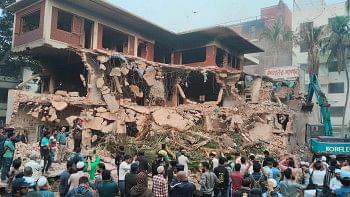Diplomatic Correspondent
Published:2025-02-06 16:37:00 BdST
Global media covers razing of AL-linked houses
International media outlets have widely covered the razing of Awami League-linked establishments since Wednesday night by student-led protesters for rooting out fascism from Bangladesh, but also highlighted the interim government’s continued failure to maintain law and order.
CNN reported the first attack was sparked by a speech Awami League (AL) chief Sheikh Hasina planned to give her supporters from India, where she fled last year during a deadly student-led uprising against her 15-year rule. Critics had accused her of suppressing dissent.
Earlier on Wednesday, some protesters threatened to “bulldoze” Hasina’s family house at Dhanmondi-32 if the former prime minister went ahead with her speech, which marked the start of a monthlong protest program by AL.
As Hasina began speaking, protesters stormed the house and started dismantling the brick walls, later bringing a crane and an excavator to demolish the building.
“They can demolish a building, but not the history. History takes its revenge,” a defiant Hasina said in response during her speech, even as the demolition continued.
The Dhanmondi-32 house came to symbolize the country’s independence — and now, protesters say, the authoritarianism they believe Hasina led.
The museum and former of home of Hasina's late father, Bangladesh's first president Sheikh Mujibur Rahman, had been set on fire last year during the student-led revolution that ended her 15 years of autocratic rule.
Hasina's father is widely viewed as an independence hero, but anger at his daughter has tarnished his legacy among Hasina's critics.
Late Wednesday, six months to the day since Hasina fled by helicopter to old ally India on 5 August, crowds carrying hammers and metal rods began beating down the walls of the building in the capital Dhaka.
On Thursday morning, diggers were being used to knock down the remaining fire-blackened walls.
Police told the BBC's Bengali service that around 700 protesters showed up at the residence on Wednesday night, and dozens of police officers were deployed who largely served as bystanders.
Student Mahmudur Rahman, 18, told AFP news agency that he joined the protest because he believed that it was justified to uproot the “symbol of fascism”.
Another protester, Mohammad Arefin, said there was no reason for the house to remain standing.
“Since we, the students, have formed the government through revolution, we find it legitimate to demolish it.”
The protesters also chanted slogans criticising India, where Hasina has lived in exile since fleeing Bangladesh last August, for denying her extradition and facing justice in Bangladesh.
Protesters also vandalised and torched other houses across the country linked to Hasina, including an arson attack on the Dhaka house of Hasina's late husband.
Crowds used government-owned excavators to smash down a building owned by Hasina's family in the city of Khulna.
The student-led movement behind the protests has also voiced plans to dismantle the country's 1972 Constitution, which they argue embodies the legacy of her father's rule.
Since Hasina's ouster, a caretaker government led by Nobel laureate Muhammad Yunus has kept the country running.
But it has struggled to quell lingering unrest.
Thousands of demonstrators have taken to the streets in recent months, placing many demands before the government, including many purely selfish illogical ones.
While Yunus' government tries to get Hasina extradited from India, it is also dealing with a looming economic crisis – Yunus has accused Hasina of faking Bangladesh's economic growth and laundering billions of dollars during her rule.
Yunus has pledged to hold elections in late 2025 or early 2026.
Vandalised homes
In the western city of Kushtia, protesters vandalised the house of a leader of Hasina's Awami League party, Mahbubul Alam Hanif.
In Chittagong, protesters held a torch procession and smashed a mural of Sheikh Mujibur Rahman.
There has been no formal comment on the wave of attacks from the interim government, and security forces stood by allowing protesters to storm the buildings.
A private security guard in the neighbourhood said he had called the fire service more than a dozen times fearing that the flames would spread to nearby buildings crowded with families.
"We cut off the electricity line ourselves," Jamal Uddin said. "I don't know when the situation will return to normal."
A shopkeeper living near Rahman's former home said he was worried at the chaos.
"This vandalism is not a good sign," he said, asking not to be named as he was fearful of reprisal for speaking out.
Unauthorized use or reproduction of The Finance Today content for commercial purposes is strictly prohibited.


